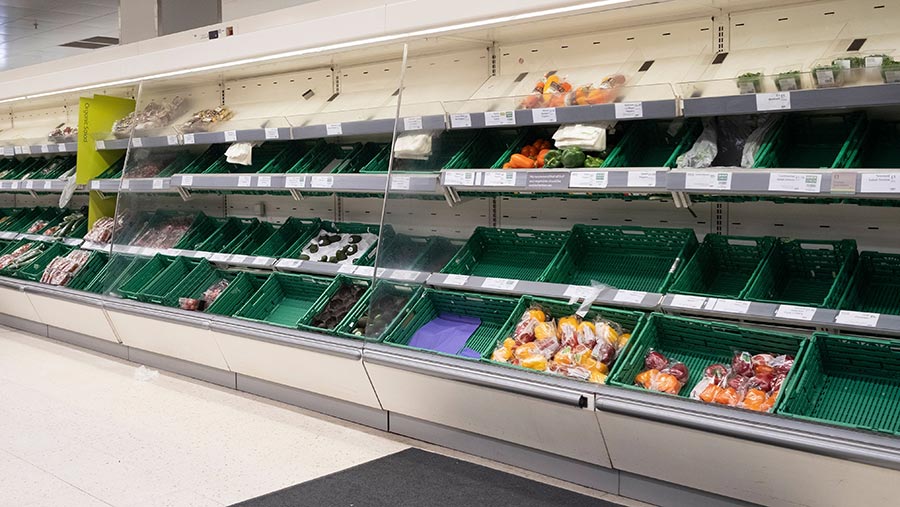Food security fears rise at prospect of second lockdown
 © Ray Tang/Shutterstock
© Ray Tang/Shutterstock Major retailers are asking shoppers not to panic buy as a survey reveals two-thirds are concerned about the impact of a second wave of coronavirus on UK food supplies.
The early days of the pandemic in March and April brought scenes of panic-buying and empty supermarket shelves were commonplace, but food supplies have since stabilised.
According to a YouGov poll, the crisis has left people feeling anxious about the availability of fresh food if the government imposes a second national lockdown in October.
See also: Food security debate: Balancing imports v self-sufficiency
British farmers and food producers continue to play an integral role in keeping the nation fed during the pandemic, which Farmers Weekly has highlighted in our #FeedTheNation campaign.
However, less than half (48%) of adults are confident that the food and farming system is prepared for a second wave of Covid-19, or a future pandemic.
Only 6% of people now say they are very confident, according to the results of the survey of more than 2,000 adults, carried out on behalf of the Agricultural Biotechnology Council, an umbrella organisation which promotes agricultural biotechnology in the UK.
Supermarkets ‘well stocked’
On Monday (21 September), a number of major retailers including Asda, Tesco and Morrisons assured customers they are well stocked with food supplies and urged customers against stockpiling.
The British Retail Consortium encouraged shoppers to be considerate when buying food and avoid panic-buying.
Public fears about the security of the UK food supply are not limited to the effects of coronavirus, the survey found.
Only three in 10 adults (32%) believe that the UK’s food and farming system is prepared for trade interruptions or problems with either the US or EU.
Two-thirds expressed fears about the consequences of climate change and climate events such as drought, amid another British summer with soaring temperatures.
Only 32% are confident that the food and farming system is prepared for environmental extremes, such as extreme heat or flooding, and only 34% are confident that we are prepared for biological threats such as new pests.
One third also raised fears for the impact of interruptions such as bans on types of seeds available to farmers, or restrictions on the use of crop protection chemicals.
However, more than half (52%) expressed support for the use of new agricultural innovations, such as new plant breeding techniques, such as gene editing, to make crops more nutritious and resistant to pests and diseases.
Farmer view
Paul Temple, a mixed farmer based in East Yorkshire and AHDB board member, said: “This year’s weather has produced the worst wheat harvest for decades and we need more than ever new breeding solutions to provide the resilience to changing climate, pests and diseases.
“At the same time, the pandemic has highlighted how important a secure food and farming system is to this country. That’s why we need to ensure we are protecting it and strengthening it for the future.
“The UK has some superb research being carried out and a fantastic opportunity to lead in Europe with new breeding techniques that will safeguard food production against the increasing threats farmers face.”
